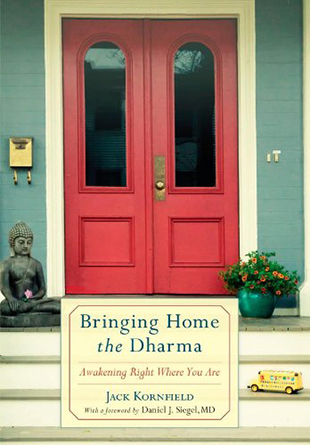"Whatever our gate to enlightenment, the first real taste, stream-entry, is followed by many more tastes as we learn to stabilize, deepen, and embody this wisdom in our own unique life. What does it look like? The facets of enlightenment express themselves marvelously in our teachers. Each manifests enlightenment with his or her own flavors.
"Dipa Ma, the wonderful grandmother in Calcutta who was one of our great masters, was a tiny person with a powerfully trained mind. Dipa Ma expressed enlightenment as love. She devotedly instructed her students in mindfulness and loving-kindness, and then she hugged them, putting her hands on their head, face, and shoulders, whispering metta phrases. They got drunk on love. Like Dipa Ma, Ammachi, a Hindu teacher from South India, manifests enlightenment as the 'hugging guru.' She goes into a trance, and all night long she holds people; she might take as many as two thousand people onto her lap and hug them. This is enlightenment as love.
"For Zen master Suzuki Roshi, enlightenment was expressed by being just where you are. A woman told Suzuki Roshi she found it difficult to mix Zen practice with the demands of being a householder: 'I feel I am trying to climb a ladder, but for every step upward I slip backward two steps.' 'Forget the ladder,' Suzuki Roshi told her. 'When you awaken, everything is right here on the ground.' He explained how the desire to gain anything means you miss the reality of the present. 'When you realize the truth that everything changes, and find your composure in it, there you find yourself in nirvana.' Asked further about enlightenment, Suzuki Roshi said, 'Strictly speaking, there are no enlightened beings; there is only enlightened activity.' If you think you are enlightened, that is not it. The goal is to let go of being anyone special and meet each moment with beginner's mind.
"Mahasi Sayadaw, the Burmese master, expressed enlightenment as emptiness. Watching him on his visits to America, we saw that he rarely laughed or judged. Instead, he exuded a quiet equanimity. Events and conversations would happen around him while he remained still. He was like space — transparent, nobody there. This is enlightenment as emptiness.
"For Ajahn Jumnien, a Thai forest master, awakening is not only empty, it's full. His robe is covered in hundreds of sacred medallions, and he employs dozens of skillful means to teach — guided meditations, sacred chants, mantras, chakra and energy practices, forest medicines, animal stories and shamanic rituals. His dharma is all-hours, nonstop, full of life and joy. There's a sense of abundance in him, and happiness just pours out like a fountain. He expresses enlightenment as fullness.
"Thich Nhat Hanh expresses enlightenment as mindfulness. When he has come to teach at Spirit Rock, two thousand people sit meditatively on the hillside and eat their apples mindfully in preparation for his arrival. A bell is rung, and he walks slowly and deliberately up the road — so mindfully that everyone sighs, 'Ahhh.' The consciousness of two thousand people is transformed just seeing this man walk, each step the whole universe. As we watch, we drop into the reality of the eternal present. This is where we awaken. Enlightenment as mindfulness.
"The Dalai Lama expresses enlightenment as compassionate blessing. For instance, once at the end of his stay at a San Francisco hotel, he asked the management to bring out all the employees. This meant the people who chop vegetables in the kitchen, who clean the carpets late at night, who make the beds. The big circular driveway filled with all those who made this hotel work but who were usually unrecognized. One by one, he looked at each one with full presence, took each person's hand, and said, 'Thank you,' moving unhurriedly just to make sure that he connected with each one fully. The Dalai Lama personifies enlightenment as compassionate blessing.
"Ajahn Chah's manifestation was the laughter of wisdom. Whether with generals or ministers, farmers or cooks, he would say, 'When I see how much people are struggling, I look at them with great sympathy and ask, "Are you suffering? Ahhh, you must be very attached. Why not let go?" ' His teachings were deep and straight to the point. He'd say, 'If you let go a little, you'll be a little happy. If you let go a lot, you'll be a lot happy. If you let go completely, you'll be completely happy.' He saw suffering, its cause, and that freedom is possible in any moment. He expressed enlightenment as wisdom."
